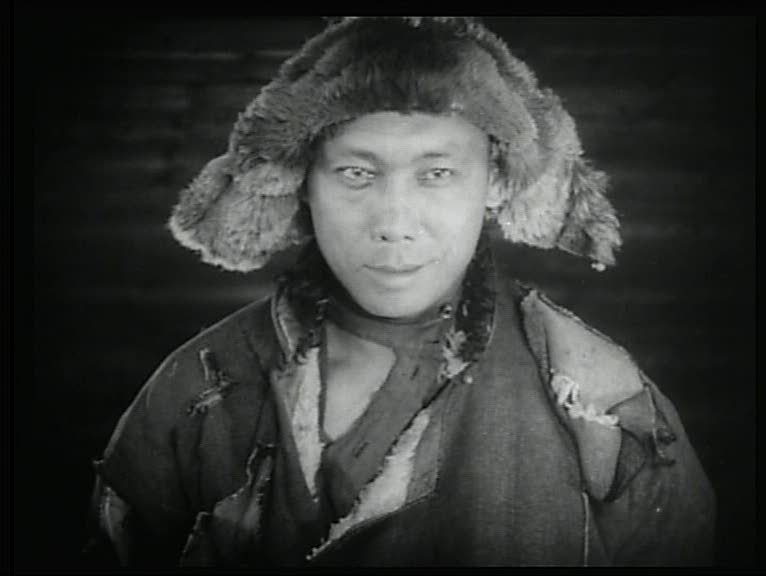
Storm Over Asia (original Russian title Потомок Чингисхана, Potomok Chingiskhana, "Heir to Genghis Khan") is a 1928 Soviet propaganda film, directed by Vsevolod Pudovkin and starring Valéry Inkijinoff.
Inkijinoff plays a Mongol herder, the Son (named Bair in the original Russian version) of an elderly herder who has acquired himself a fine fox pelt. The father sends his son to the nearest Russian trading post to sell the pelt, anticipating five hundred gold pieces, enough to buy food "for many months". It's 1918, and the local trading post has been taken over by the British army, which has invaded Russia in order to support the Whites and stamp out the Soviet Bolshevik revolution. The British trader tries to cheat the herder, offering him only a few coins for the pelt. The herder protests and a fight breaks out. One of the trapper's lackeys attacks the herder and gets cut in the hand; the herder has to flee to the forests to avoid arrest and execution.
Two years later, the herder is still living in the forest when he runs across a Soviet partisan unit that is fighting the British. The herder throws his lot in with them, and is still fighting with them when he is captured trying to save a herd of cattle from the British soldiers who've come to steal it. The British commander orders the herder to be shot, but afterwards discovers an amulet identifying the herder as a direct descendant of Genghis Khan. He hits on the idea of installing the herder as the new Great Khan and leader of a puppet government. The herder, wounded but still alive, is promptly made king, but is by no means willing to take orders from the British.
Tropes:
- An Aesop: Capitalism and imperialism are evil. The nomads of the steppe should support the Soviet Union and fight back against their capitalist oppressors.
- Belief Makes You Stupid: This being a propaganda film made in Stalin's Soviet Union, it takes a dim view of religion. The Buddhist ceremony shown in the film, while authentic, is shot to look somewhat ridiculous, and the reveal that the reincarned lama is a baby is played for a gag. The monk praying over the herder's sick father has an eye out for the fox pelt.
- However, this trope is not as much in effect, as Pudovkin was called by Soviet censors for making the Lamas too "appealing". Pudovkin himself was on good terms with them since the Buddhist monks co-operated with the production and were very helpful to the film.
- Berserk Button: The herder finally snaps when another Mongolian prisoner is shot and killed right in front of him.
- Capitalism Is Bad: The traders will cheat you and steal from you, especially if you have a nice fox pelt.
- Chekhov's Boomerang: The fox pelt leads to the herder fleeing to the forest and joining the partisans. Then, towards the end of the film, when he's being set up as Khan, the herder is outraged to see the fox pelt draped around the shoulders of a British officer's wife.
- A Child Shall Lead Them: The reincarnated lama that the British commandant goes to meet is a toddler.
- Corrupt Church: The Buddhist monks are in cahoots with the British.
- Death Glare / Kubrick Stare: The herder is none too happy about being fitted out in Western clothes and saluted as Khan.
- The Dog Bites Back: The herder finally rebels against his British sponsors/captors, going on a one-man wrecking spree around the commandant's headquarters before escaping. In the final scene he is on horseback leading an attacking army against the British.
- Evil Colonialist: The British trader, who cheats the Mongol out of a fair price for his fox pelt. And all the British, who exploit and intimidate the natives.
- Evil-Detecting Dog: When three herders approach the protagonist's father's yurt, all the animals outside the yurt flip out. The visitors are jealous of the fox pelt and try to steal it.
- La Résistance: The Soviet partisans fighting against the British occupiers.
- My God, What Have I Done?: The British soldier ordered to shoot the herder obviously feels conflicted about it, and sickened after he actually does it.
- Puppet King: The British set up the herder to be this. He has other ideas.
- Pygmalion Snap Back: The British dress the herder up Western-style, in a formal suit, with Western dress shoes that he struggles to walk in. This humiliates him, and eventually he violently rebels.
- A Storm Is Coming: As the title indicates. In the final scene, as the British soldiers ride out to meet the Mongols, a literal dust storm rises up, gusting in the faces of the British as the Mongols charge.
- Very Loosely Based on a True Story: The Allies of World War I did in fact make incursions into Russia in support of the White Russian counterrevolutionaries. And the herder in this film seems loosely inspired by Damdin Sükhbaatar, leader of the Mongolian communist revolution of 1921. However, except for Japanese intervention in Siberia and the Far East, the Allied incursions were limited to western Russia. The British never intervened in Mongolia or any other Central Asian areas—but the Russians did, first the Whites led by Roman von Ungern-Sternberg and then the Bolsheviks.
- Yellowface: Averted. Inkijinoff, although a Russian citizen, was an ethnic Buryat-Mongol. He later emigrated to France and had a long career playing Asian villains in French cinema.
